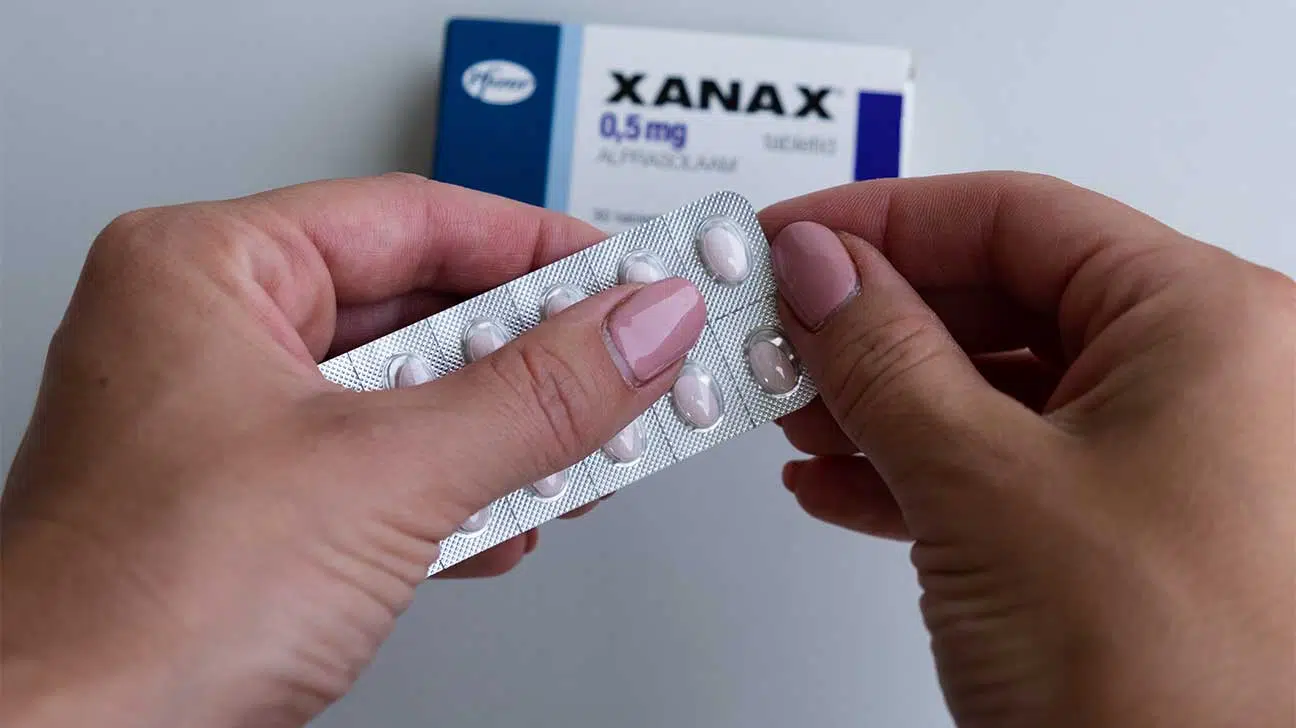
Alprazolam, more commonly known by its brand name Xanax, is a benzodiazepine (benzo) that affects the central nervous system and has sedative effects.
It’s approved by the Food and Drug Administration (FDA) to treat anxiety disorders and panic disorders.
Xanax works by increasing the effects of gamma-aminobutyric acid (GABA), a chemical your brain naturally releases when you feel anxious or are having a panic attack.
However, when you use medication for a prolonged period of time, you can develop a drug tolerance. This means you’ll need more of the medication to feel the same effects.
This can lead to additional problems and side effects, so it’s important to know how to lower your Xanax tolerance.
How A Xanax Tolerance Forms
Before understanding how to lower your tolerance to Xanax, it’s important to understand the factors that can contribute to developing a benzodiazepine tolerance.
Long-Term Use
First, long-term Xanax use can lead to tolerance. This is because the longer you use a medication, the longer your body has to get used to it.
Higher Doses Of Xanax
On a similar note, high doses of Xanax can contribute to the development of a tolerance. If you start by taking large doses of this medication right away, your body will need higher doses as time progresses.
In other words, you can develop a tolerance that may lead you to take unsafe doses of Xanax.
Cross Tolerance
Lastly, you can develop a cross-tolerance to Xanax. A cross-tolerance is one that occurs due to a previous tolerance to medication with similar effects.
In the case of Xanax, this includes other benzodiazepines like diazepam (Valium), lorazepam, triazolam, and halazepam.
How Quickly Does Benzo Tolerance Develop?
With so many factors involved in developing a benzo tolerance, you may be wondering how it can develop.
Unfortunately, tolerance to this class of drugs can happen pretty quickly. To be specific, you can develop a tolerance within days or weeks of using the medication.
Ways To Lower A Xanax Tolerance
There are a variety of ways you can go about lowering your Xanax tolerance. As a disclaimer, some methods may require help from a healthcare professional.
First, you can seek behavioral therapy or psychiatry to help you manage your anxiety or panic attacks in additional ways rather than just counting on Xanax.
Another way you can lower your Xanax tolerance is by taking a break from the medication.
By giving your body a chance to go without the medication for a short period of time, it may need a lower dosage to feel the same effects.
Next, you and your medical provider can try tapering. Tapering involves slowly decreasing the dose of Xanax you take. By doing this gradually, your body can adjust to the change and still feel the effects of Xanax
Lastly, your doctor may start prescribing a different benzodiazepine with effects that last longer. Though cross-tolerance is possible, a longer-lasting medication may be more effective at lower dosages.
The Link Between Tolerance And Xanax Addiction
Tolerance to Xanax can lead to other risks. Precisely, Xanax tolerance is often associated with benzodiazepine addiction.
As your tolerance continues to increase, you start taking higher and more frequent doses, which can put you at a higher risk of becoming addicted.
That being said, it’s vital to consult your doctor if you notice your tolerance increasing.
Can A High Xanax Tolerance Lead To Withdrawal Symptoms?
You may be wondering if having a high tolerance to Xanax can lead to withdrawal symptoms. Tolerance itself cannot lead to withdrawal symptoms.
However, high tolerance can lead to addiction or physical dependence, both of which can cause Xanax withdrawal symptoms when you stop taking the drug.
Treatment Options For Benzodiazepine Addiction
Improper benzodiazepine use is incredibly dangerous and can be life-threatening. In fact, mixing it with alcohol or other prescription drugs like opioids can result in fatal consequences.
To help you through withdrawal, cravings, and detox, seeking out medical advice and care is vital.
If you’re feeling overwhelmed by the countless facilities, check out AddictionResource.net. We can help you find the best addiction treatment centers in your area.
You can find top-notch rehab facilities based on your city, state, or the kind of treatment you need. In other words, there are options for all kinds of substance abuse.
Additionally, if you have other requirements for your treatment center, we can help with that.
For example, we can narrow your options to locations that are LGBTQ-friendly, women-only, men-only, Spanish-speaking, Christian, and more.
With so many options, you can have peace of mind knowing that you’ll receive substance abuse treatment in an environment where you feel comfortable.
Find Substance Use Disorder Treatment Services
Call our helpline at AddictionResource.net today if you or your loved one is struggling with drug use. We’ll direct you to the best addiction treatment centers in your area.
Addiction Resource aims to provide only the most current, accurate information in regards to addiction and addiction treatment, which means we only reference the most credible sources available.
These include peer-reviewed journals, government entities and academic institutions, and leaders in addiction healthcare and advocacy. Learn more about how we safeguard our content by viewing our editorial policy.
- U.S. National Library of Medicine: MedlinePlus — Alprazolam
https://medlineplus.gov/druginfo/meds/a684001.html - National Institute on Drug Abuse (NIDA) — Benzodiazepines and Opioids
https://nida.nih.gov/drug-topics/opioids/benzodiazepines-opioids - Substance Abuse and Mental Health Services Administration (SAMHSA) — Co-Occurring Disorders and Other Health Conditions
https://www.samhsa.gov/medication-assisted-treatment/medications-counseling-related-conditions/co-occurring-disorders - U.S. Department of Justice Drug Enforcement Administration (DEA) — Drug Fact Sheet: Benzodiazepines
https://www.dea.gov/sites/default/files/2020-06/Benzodiazepenes-2020_1.pdf


